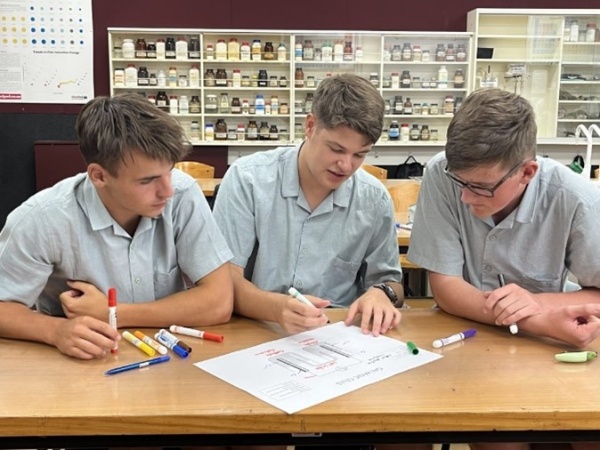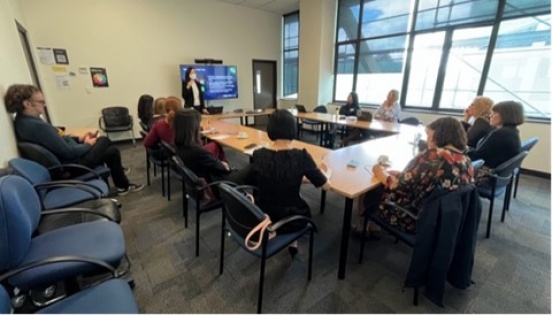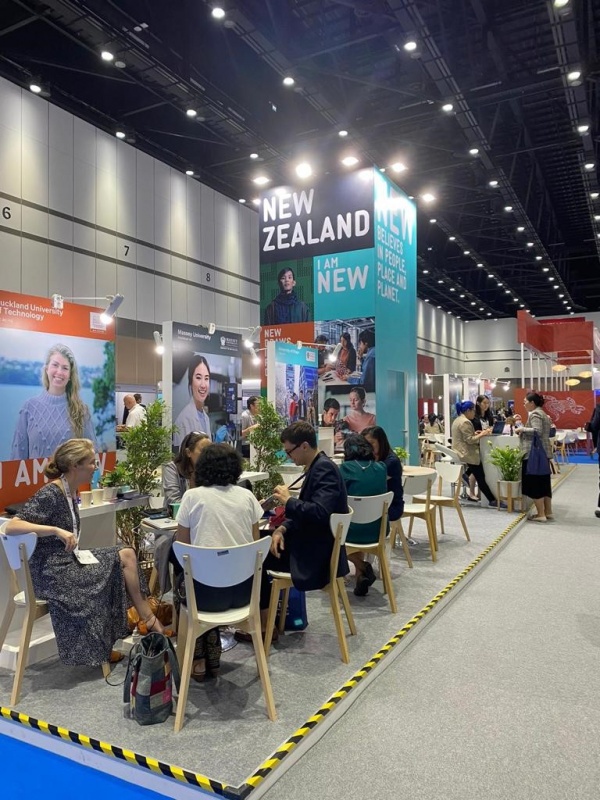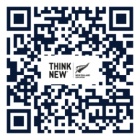Search
Showing 10 of 1007 results for gabrielaaa06302 of
-
First marae-led Prime Minister’s Scholarships for Asia recipients build indigenous connections in Japan
The first marae-led Prime Minister’s Scholarships for Asia recipients (members of Te Piruru Papakainga, Ngāti Maniapoto) visited Japan for a six-week visit that included a customised internship that connected them with indigenous Ainu organisations and villages in Hokkaido.
ENZ’s Manukura Chief Advisor Māori, Ed Tuari and Director of Education – Japan, Misa Kitaoka, welcomed the scholarship recipients in Tokyo in early January.
This is a great outcome for the Prime Minister’s Scholarship Programme, which has seen an increase in Māori participation. The latest round of applications for the scholarships saw an increase in Māori participation to 22 percent in 2022 from 5 percent from 2016 to 2019.
ENZ is eager to continue partnering with iwi, marae and whānau groups to raise Māori participation in the Prime Minister’s Scholarship programme, particularly in the current group round that opened for applications in March.
ENZ’s Manukura Chief Advisor Māori, Ed Tuari said it was a privilege to participate in what is an important milestone for building indigenous connections between Māori and the Ainu people of Japan.
“This is a significant achievement for ENZ Manapou ki te Ao. I want to acknowledge this collective achievement as we break new ground with this marae-led group of PMSA recipients.
“It’s hugely encouraging to see the increase of Māori participation in the latest round of the scholarships. This is a demonstration of ENZ ‘walking the talk’ to ensure Māori are better represented in opportunities to share and learn on the global stage, as well as promote indigenous to indigenous exchanges.”
ENZ’s Director Scholarships Carla Rey Vasquez said she was excited to see the growth and learnings that these programmes would bring to the wider whānau and iwi.
“Our scholarship recipients cherished the opportunity to connect with indigenous communities in Japan, and they particularly appreciated the value of reciprocity as well as the importance of generational knowledge being shared along.
“We look forward to continuing to raise Māori participation in the Prime Minister’s Scholarship programme.”
The latest visit by scholarship recipients has also been a good opportunity to enrich the existing education connections between New Zealand and Japan under a Memorandum of Understanding between New Zealand and the Hokkaido Government, which was renewed in 2022.
The customised internship that saw scholarship recipients visit Ainu villages and organisations, was organised by the Hokkaido Government and the Hokkaido Board of Education.
ENZ’s Director of Education – Japan, Misa Kitaoka, said the visit by scholarship recipients was timely as Japan starts to promote Ainu history, language and culture.
“The Ainu people received official recognition as ‘indigenous people of northern Japan’ from the Japanese government in 2019. As the government begins to promote Ainu history, language, and culture in Japan, Ngāti Maniapoto’s visit to Hokkaido was timely and appreciated by the Ainu community to learn about how New Zealand society has embraced Māori language and culture.”
Applications are open for the 2023 group round of the Prime Minister’s Scholarships for Asia and Latin America until 23 April 2023. More information on applications is available on ENZ's dedicated scholarship website here.
[updated 18 April 2023]
-
Rebuilding New Zealand education’s visibility in China
Last month, Lillian spent three weeks in New Zealand in what was her first visit to the country as part of her role at Education New Zealand Manapou ki te Ao.
The two-pronged purpose of her trip was to provide refreshed marketing insights to education providers in New Zealand and hear from providers on their expectations and the challenges they face when marketing their offering in China.
Here are Lillian’s takeaways from her visits and interactions in New Zealand –
Need for storytelling that better highlights New Zealand education’s points of difference
- Engaging with education providers and visiting campuses highlighted to me several points of difference for New Zealand education, particularly how it is innovative, how it develops work-ready graduates, as well as how international students are welcomed and valued in New Zealand. Seeing these points of difference in real time made me realise how underrated the New Zealand education story is overseas, and the need to tell that story better. We need to focus on telling a New Zealand education story that is authentic and has concrete examples. A more visual storytelling format would be ideal to deliver the story.
- Tip: Demonstrate the teaching and student engagement practices your institution delivers using visuals (images or videos).
- Example: Take photos/videos in the lab, with robotics machines, with the 3D printer, the hands-on experience and student engagement (student hub), self-learning and learning from their peers.

Visit to Middleton Grange Intermediate School to understand the differences between New Zealand and Chinese classrooms
Demonstrate outcomes of education programmes via successful alumni stories to promote offering
- Chinese parents and students are very outcome driven. Institution or programme rankings remain the key consideration, but other indicators and outcomes are becoming increasingly important, including employability, international recognition, and a life-changing experience.
Demonstrating the outcome of an education programme by leveraging successful student or alumni stories and testimonials can be a critical in activating ‘word-of-mouth’ promotion that influences the decision-making of prospective students and parents.
- Tip: Highlight successes or outcomes for students through stories. Degree + good experience = happy alumni story. Parents and students want to know if a qualification from a New Zealand institution will be recognised in China, the world or if it could be a pathway to further study.
- Example: A Chinese student studied a business degree with a New Zealand tertiary provider and then landed a job at a Fortune 500 company or became an industry leader. Or if a Chinese student studied virtual art in a New Zealand PTE, got a job in Weta Digital, which has worked on recent Chinese blockbuster films. We have seen Chinese media are very interested in interviewing and profiling such students in their publications.
Consider digital content in local language for marketing impact
- Research indicates that more Chinese students do their own research online and make their own decisions when choosing an overseas study destination and institution. So having a digital presence on China’s digital platforms is critical. Digital content in local languages also goes a long way in building brand awareness. If resources allow, exploring multiple channels and interacting with your audience in local languages will help you to gain a major advantage in optimising brand awareness and driving results in student recruitment.
- Tip: Host Chinese language and China specific channels such as an official WeChat account. We understand it isn’t easy to set one up. If you are unable to set up a WeChat account for any reason or don’t have Chinese-speaking staff, having a Chinese language website is the next best option. Having crucial information online in Chinese helps promote the institution as trustworthy. Parents and students will use the Chinese language website to confirm information, even if they rely heavily on agents or school counsellors.
- Example: ENZ has been working to optimise our digital presence in China, including with our Chinese language website: studywithnewzealand.cn. We recently revamped the storefront of SWNZ.cn to bolster its localisation, ensuring that from a Chinese user point of view, we can keep them interested and engaged in considering a New Zealand education provider. To ensure our digital presence continues to be fit for purpose, we undertake regular work to update and troubleshoot our platform and content.

ENZ’s Lillian Zhang presents China Marketing Insights and Strategies session to members of Study Dunedin on 24 February
With China fully re-opening to the world in January, the tempo of in-person events in the country is at pace already.
ENZ’s Greater China team is looking forward to supporting New Zealand providers visiting the country for agent seminars in Guangzhou and Beijing in May and other events later in the year.
If you have any enquiries related to marketing in China, please contact: china@enz.govt.nz
- Engaging with education providers and visiting campuses highlighted to me several points of difference for New Zealand education, particularly how it is innovative, how it develops work-ready graduates, as well as how international students are welcomed and valued in New Zealand. Seeing these points of difference in real time made me realise how underrated the New Zealand education story is overseas, and the need to tell that story better. We need to focus on telling a New Zealand education story that is authentic and has concrete examples. A more visual storytelling format would be ideal to deliver the story.
-
From the CE: New Zealand education promotion continues at pace
I can assure you I have never seen as much interest in New Zealand as an education destination. Despite the challenges we’re all aware of and the activities of our competitor countries, the New Zealand education offering remains attractive. We all must continue to tell the New Zealand education story.
On Friday 17 March, Minister of Education Jan Tinetti announced new appointments to our Board. I want to acknowledge outgoing Board Chair, Steve Maharey, and welcome Tracey Bridges to the role. Steve has been a stalwart and tireless advocate for international education, both in the community and the corridors of power for over 30 years. In his time as our Chair, he has seen and contributed to enormous change within the sector and ENZ. Personally, I have appreciated his deep understanding, straight talking and clear direction.
Tracey Bridges has knowledge of regional economic development, expertise in strategy, risk and reputation management, and in social marketing. She is Chair of the Wellington Economic Development Agency Limited (WellingtonNZ), co-founder of The Good Registry and sits on the Boards of Sky Stadium, Whānau Āwhina Plunket, the Wellfed NZ Trust and the Digital Media Trust.
Tracey is joined by Dr Therese Arseneau. Dr Arseneau also has knowledge of economic development including international education’s contribution to regional economic development, and governance experience in the tertiary sector at the Ara Institute and the Open Polytechnic. She previously chaired Regenerate Christchurch and Enterprise North Canterbury.
We all know that the contribution of international education is far broader than just the direct and immediate economic impact of the students that come to New Zealand. For the first time, ENZ along with EY have sought to quantify the extent and the value of these wider benefits.
Research commissioned by ENZ that will be released before the end of March found that international education is not only a significant contributor to the New Zealand economy but also that international students living and working in the country bring in a raft of social, cultural, and international benefits. It goes on to explore the extent of the indirect longer-term contribution to New Zealand’s GDP from the small proportion of international students that remain in New Zealand on completion of their studies. The research also quantifies the impact of the pandemic.
Look out for the formal release and when it is available I urge you to download the report from Intellilab.
To complete your international education-related reading list, our Briefing to the Incoming Minister, Minister Tinetti is now available here on the ENZ website. The BIM, as it is known, is prepared when new Ministers are appointed to portfolios.
He maurea kai whiria! – Ignore small matters and direct effort toward important projects!
Ngā mihi nui,
Grant McPherson
-
Study with New Zealand online launched for adult professional learners
The Study with New Zealand Online platform – an outcome of the Strategic Recovery Plan for International Education 2020 – is a New Zealand owned and branded platform that offers global learners a new way to engage with a New Zealand education.
Study with New Zealand Online has up to 60 courses available from 20 + education providers.
ENZ’s General Manager – Sector Engagement, Wendy Kerr, said the pilot learning platform aims to tap into the adult professional learner market.
“Our research shows that there is a significant career-oriented, adult learner market that is looking for ways to advance within their current career. Study with New Zealand Online aims to tap into that market and test if there is value in what New Zealand can offer uniquely.
“Good examples of courses unique to New Zealand are a short course on sustainability in the wine industry delivered by NMIT | Te Pūkenga. If you are in the wine industry, you clearly know New Zealand wines and our expertise in sustainability. The same goes for an ECE course offered by Te Rito Maioho ECNZ, which showcases New Zealand’s bicultural approach in this field.”
Kerr says, “We know how hard the pandemic was on international education. We know this project is about exploring new and different ways to deliver, and new and different audiences for, the New Zealand education experience. The goal is to diversify and build resilience.”
Findings from the Study with New Zealand Online pilot will help inform insights and recommendations on how New Zealand’s education sector could transform to a more sustainable future state through the diversification of our international education offerings.
Visit Study with New Zealand Online on https://online.studywithnewzealand.govt.nz/
-
Applications are open for the Europe and Latin America Engagement Fund
The aim of this funding is to support engagement activities with education agents from Europe, Brazil and Colombia. New Zealand institutions are welcome to submit proposals and apply for up to $3000 per project. We will fund up to 15 projects that focus on engaging with agents from Europe, Brazil and Colombia.
ENZ’s Market Development Manager – Europe, Adina Stoye, said ENZ has a strong and loyal network of agents in Europe, especially Germany and Italy.
“They are keen for support and engagement with New Zealand institutions, and welcome opportunities for events and promotional activities. This initiative is a wonderful opportunity for New Zealand education providers to promote their education offering through building education agent networks.”
Proposed activities should be completed during the second half of 2023 and have firm goals and outcomes in place. Examples of activities are a scholarship campaign, contribution to bringing an agent to New Zealand for a famil, or supporting a trip to attend an event organised by agents.
ENZ’s Director of Engagement – Latin America, Javiera Visedo said education agents in Latin America are keen to learn more about what a New Zealand education has to offer, with students excited at the prospect of studying here. Reconnecting with New Zealand education providers is a top priority for them.”
Applications are open to New Zealand institutions only. This includes New Zealand education providers such as universities, Private Training Establishments (PTEs), English Language Schools (ELS), regional economic development agencies, schools, and peak bodies. Some providers may wish to work together to submit their applications, for example high schools or ELS.
To apply, visit this page. Once applications close, they will be reviewed by a panel of ENZ staff according to the guidelines included on page 5 of the Request for Proposal document.
We will host an information session about the funding and how to apply on Thursday 27 April at 9 am. To register for the session, fill out the form here.
- Applications are open until Friday 12 May at 5pm and applicants will be notified of the outcome on Friday 9 June.
-
Re-building connections across the globe at APAIE
Moving forward into the post-COVID era, the theme was appropriately ‘Towards a sustainable future for international education in the Asia Pacific’.
New Zealand’s presence at the conference was strong with all eight New Zealand universities and Whitecliffe School of Fashion and Sustainability attending, along with representatives from Education New Zealand Manapou ki te Ao (ENZ) and Immigration New Zealand (INZ).
ENZ’s Chief Executive Grant McPherson travelled to the event.
“It is exciting to see the commitment of New Zealand institutions to attend these key regional events,” he said. “The APAIE conference is one of ENZ’s flagship events and supporting these events is a critical component of our broader strategy to rebuild connections across the globe while also rebuilding a more resilient and sustainable sector.”
Ben Burrowes, ENZ's Regional Director Asia said, "the New Zealand Pavilion was extremely busy across the three days of the conference. The event proved a great opportunity to meet kanohi ki te kanohi (face to face) to re-build our brand awareness as well as raising our profile with our key bilateral partners and potential new partners."
During the conference, ENZ's Director of Scholarships, Carla Rey Vasquez, and the Centres of Asia Pacific Excellence (CAPEs) Education Director, Libby Giles, delivered a presentation showcasing New Zealand's Global Citizenship journey. The session explored examples of how Global Citizenship Education (GCED) has been embedded across New Zealand schools, universities, and government entities as a way to innovate and transform education practices, including through the integration of Te Ao Māori views around this topic.
Carla said, "It was great to demonstrate to audiences how local and international students can come together as global citizens through a focus on intercultural exchange, as well as through understanding local culture and knowledge.”
Outside the conference, ENZ's Thailand team organised a series of meetings with key Thai government ministries and agencies including the Ministry of Education, Thailand's National Innovation Agency, the Office of Civil Service Commission, and the Ministry of Higher Education, Science, Research, and Innovation.
Next year’s APAIE conference will take place in Perth, Western Australia in March.

Meetings at the New Zealand Pavilion
-
Call for speakers for NZIEC KI TUA 2023
NZIEC KI TUA 2023 will be held in Ōtautahi Christchurch from 16 to 18 August 2023 at Te Pae Convention Centre. A welcome function will occur on Wednesday evening followed by two days of conference sessions on Thursday and Friday.
2023 marks the 30th time our conference will be held, and this year’s theme is Te Ara Ki Tua – the pathway ahead. As we celebrate this milestone, our theme encourages us to consider how our sector can thrive in the future.
We’re calling for speakers to help us explore the following sub-themes:
- Excellent Experiences – How can we foster excellent experiences for international students studying with Aotearoa New Zealand?
- Marketing Smarts – What are the most effective ways to market to and recruit international students?
- Growing Global – How can we grow our relationships with international partners?
- Authentically Aotearoa – How can our international education offerings tap into what makes our country special?
- Fresh Offerings – How can we develop fresh programmes, products, services and partnerships and take them to the world?
Please refer to the NZIEC KI TUA website here for detailed information on the theme and sub-themes, session formats, tips for your abstract and biography, and speaker terms and conditions.
You can submit your speaking proposal through the NZIEC KI TUA Speaker Portal. Submissions close on 22 May 2023.
If you have any questions, please contact us at nziec@enz.govt.nz.
We hope you will consider joining us at NZIEC KI TUA to discuss the key opportunities and challenges facing our sector as we discuss Te Ara Ki Tua.
An in-person format and early bird registration
Subject to pandemic settings, this year’s conference will be an in-person format. Sector feedback revealed a strong desire to return in-person, in part to facilitate kanohi-ki-te-kanohi connections after so many years apart.
We are not intending to offer a hybrid option (in-person and virtual format) this year as this requires additional resources to deliver and a hybrid approach results in inferior experiences for both audiences. To support attendance, and in recognition of the impact of Covid-19, a discounted early bird registration rate will be available this year.
- Excellent Experiences – How can we foster excellent experiences for international students studying with Aotearoa New Zealand?
-
NauMai NZ and the NauMai NZ WeChat mini programme
‘Nau mai’ is a te reo Māori phrase of invitation and welcome and NauMai NZ is the NZ government's official student experience platform, designed to support international students living and studying in Aotearoa New Zealand
NauMai NZ is written in plain English and provides practical, trusted, peer-reviewed content, designed to support and improve students’ living and study experiences. This includes information and resources to support students before arriving in Aotearoa (including useful tips on moving to New Zealand and what they need to bring), though to information to help them navigate daily life once here, including on:
- Making friends and building social connections
- Exploring and experiencing Aotearoa – the culture and the country
- Getting advice to improve wellbeing, study and living experiences
- Managing money, finding accommodation, and understanding healthcare in New Zealand
- Balancing work and study and understanding workplace culture, and much more.
You can explore more via this link.
ENZ has also developed the NauMai NZ WeChat Mini Programme. This is a companion platform to the English platform, to better support Chinese students who prefer the WeChat ecosystem. Information from the English platform is available in Chinese on the mini programme, as well as specific features that provide peer-to-peer support, such as video sharing, livestreams, forum functionality and student stories.
The following QR codes can be shared with your international students. Printed flyers are also available and so if you would like these sent to you, or have any questions for our Student Experience team, please do not hesitate to contact Faymie Li, faymie.li@enz.govt.nz, and Ross Crosson, ross.crosson@enz.govt.nz.


Manaakitanga is at the heart of what we all do, and ENZ aims to support you and your mahi. He waka eke noa. We are all in this together.
-
Student welcomes continue throughout the country
Timaru
In the Timaru District, a total of 83 students from America, China, Japan, Germany, South Korea, Hong Kong and Laos were officially welcomed by the Mayor at a function at the Caroline Bay Hall on March 20. It was the first time a mayoral welcome of students has been held in Timaru since Feb 2020.
The welcome featured performances from the Roncalli College kapa haka group and Mountainview high School’s jazz band. Guest speakers included district Mayor, Nigel Bowen and MP for Rangitata Jo Luxton.
Whanganui
Earlier this month 27 students from Japan, India, Germany, China, Thailand, and Scotland were treated to a rousing (and musical) welcome from the Cullinane College kapa haka group at the Cooks Gardens event centre in Whanganui.
Whanganui Deputy Mayor Helen Craig welcomed the students to “New Zealand’s only UNESCO City of Design” highlighting the importance of cultural interaction between international students and their New Zealand counterparts.
Cullinane College kapa haka group welcoming Whanganui’s international students. Click on the image to view the video. -
From the CE: Our focus for the next 12 months
Kia ora tātou,
"To help providers of international education to build back onshore offerings" is Focus Area One of the New Zealand International Education Strategy. There are nine key short-term actions in Focus Area One. Education New Zealand Manapou ki te Ao is the lead Government agency in four actions and has an important role to play in eight of the nine. It can be no surprise then that for the next 12 months, and our next financial year starting in June, that the majority of ENZ's energy, time and resources will be focused on attracting learners to study with New Zealand.
This is no small challenge. Our borders have been open now for just eight months. And while students are returning, the latest visa application numbers I've seen report in the order of 43,000 applications (offshore and onshore), the recovery is variable at best. Even within the university sector, that on the face of it looks to have recovered better than others, the experience is mixed. Within the PTEs and English Language schools we have a long way to go to reach the levels of 2019 and early 2020. In such a highly competitive market, it is going to take some time to regain awareness with learners and overcome the head start other countries gained.
All our budgets are tight. At the very time we need to be investing and getting offshore to renew partnerships and networks, we are all resource-constrained and having to watch every cent. ENZ is no exception.
This means that for the next 12 months, more than ever, we need to focus. We need to focus our limited resources to where they have the greatest impact, and we need to be aligned as one with the sector.
India is an excellent example of a partner market that is worthy of focus. I have just returned from leading an ENZ delegation to India. India is forecasting economic growth of 6-7% every year for the next three to five years. They know, and their national education strategy makes it clear, they need educated, skilled and talented people to realise this opportunity. I repeatedly heard, "They want their people back".
That five Deputy Vice Chancellors joined the 23 sector representatives tells you how important India is. As one of the five said to me, "India today is what China was 15 years ago".
To be successful we need to agree that India is important. It is. We need to go there together. We will. We also need to work with our colleagues in other Government agencies to ensure they are aligned. This is what success looks like for me. And this is the level of focus on building back, and the level of partnership with the sector, that I expect from my ENZ teams over the next 12 months.
I will also work with them to secure the many gains we have made in government-to-government relationships, scholarships, diversity, equity, and inclusion, social licence, and in building a sustainable future. All the good work of the past two years remains important for the long-term future, set out in Focus Area Two: Building a new future for international education.
We are all very passionate about international education and its ability to transform lives. In 2023/24 when the sector is stronger than today, all of us will be better placed to address the short term and the medium to long term. Today our focus must be the immediate needs.
He moana pukepuke e ekengia e te waka
A choppy sea can be navigated
This proverb acknowledges the changing and challenging environment that we currently find ourselves in and how it can be navigated by collaboration and innovation.
Ngā mihi nui,
Grant McPherson

